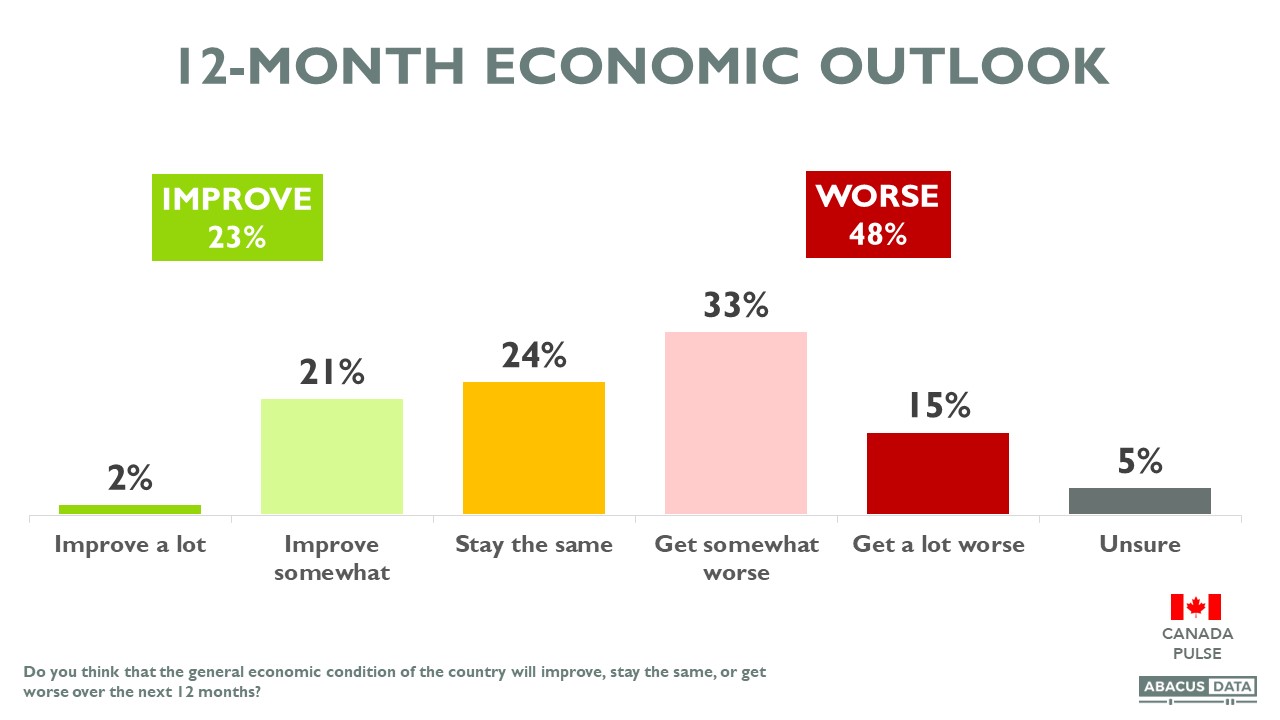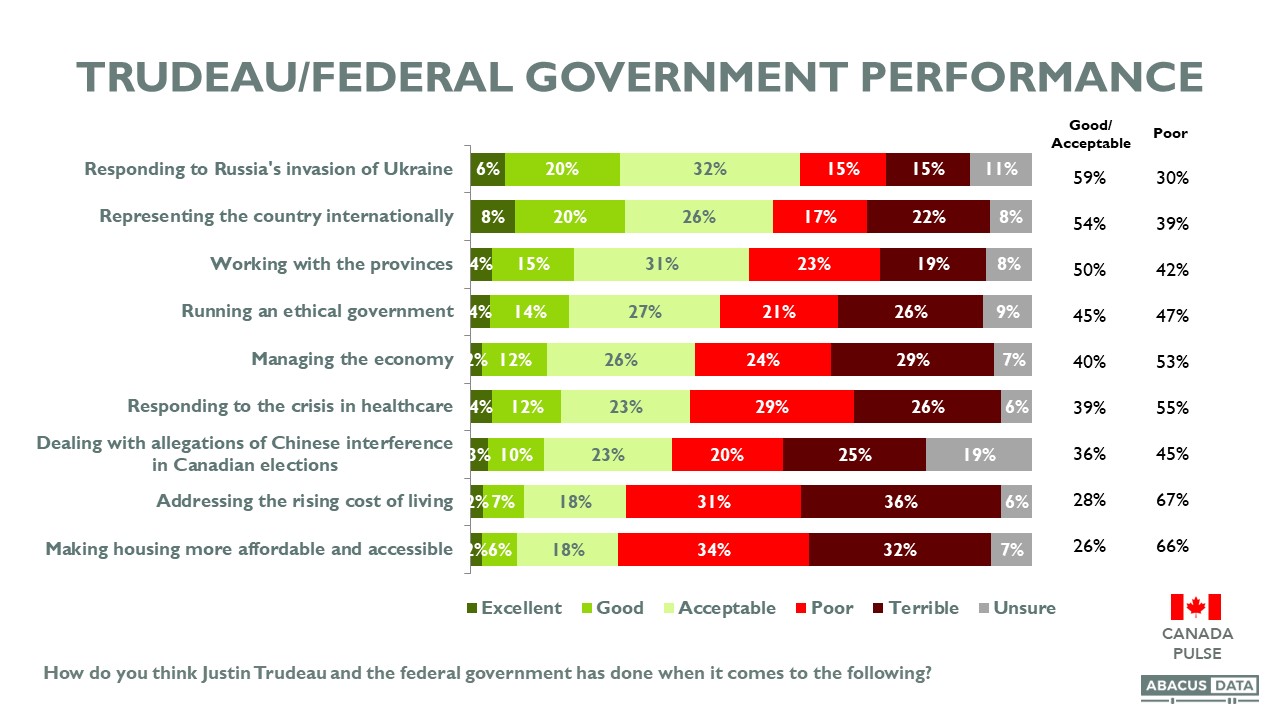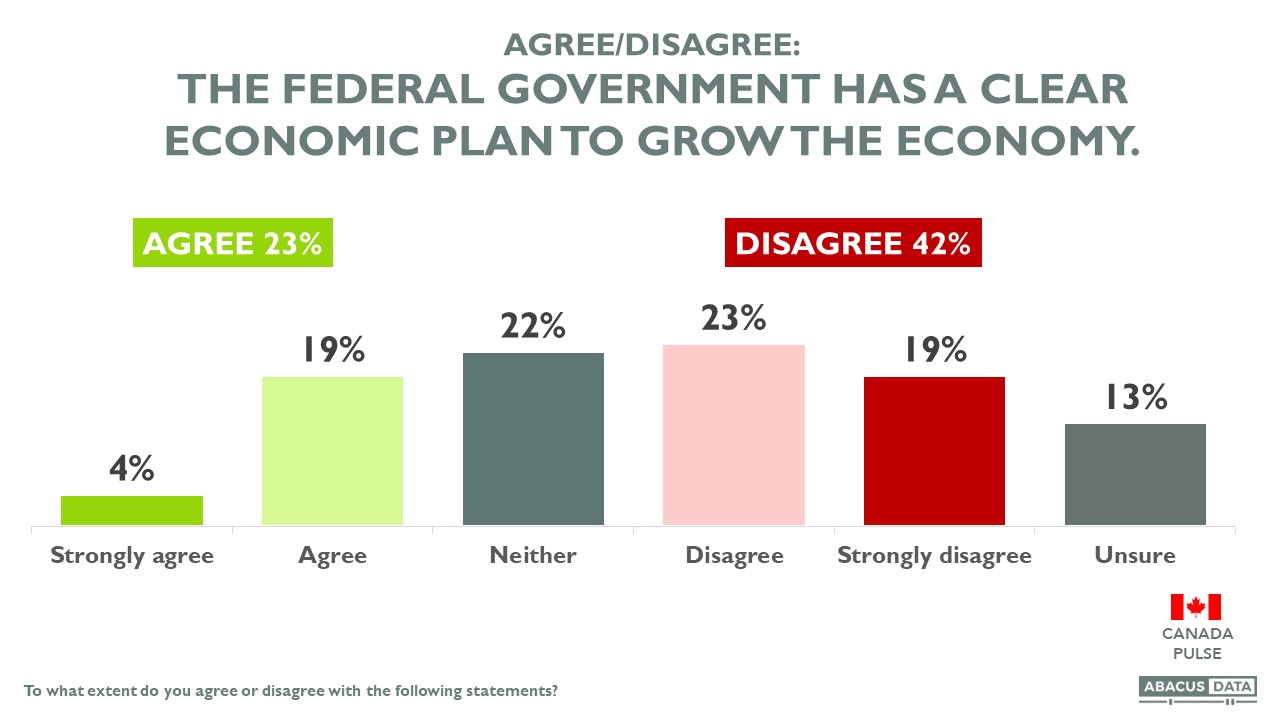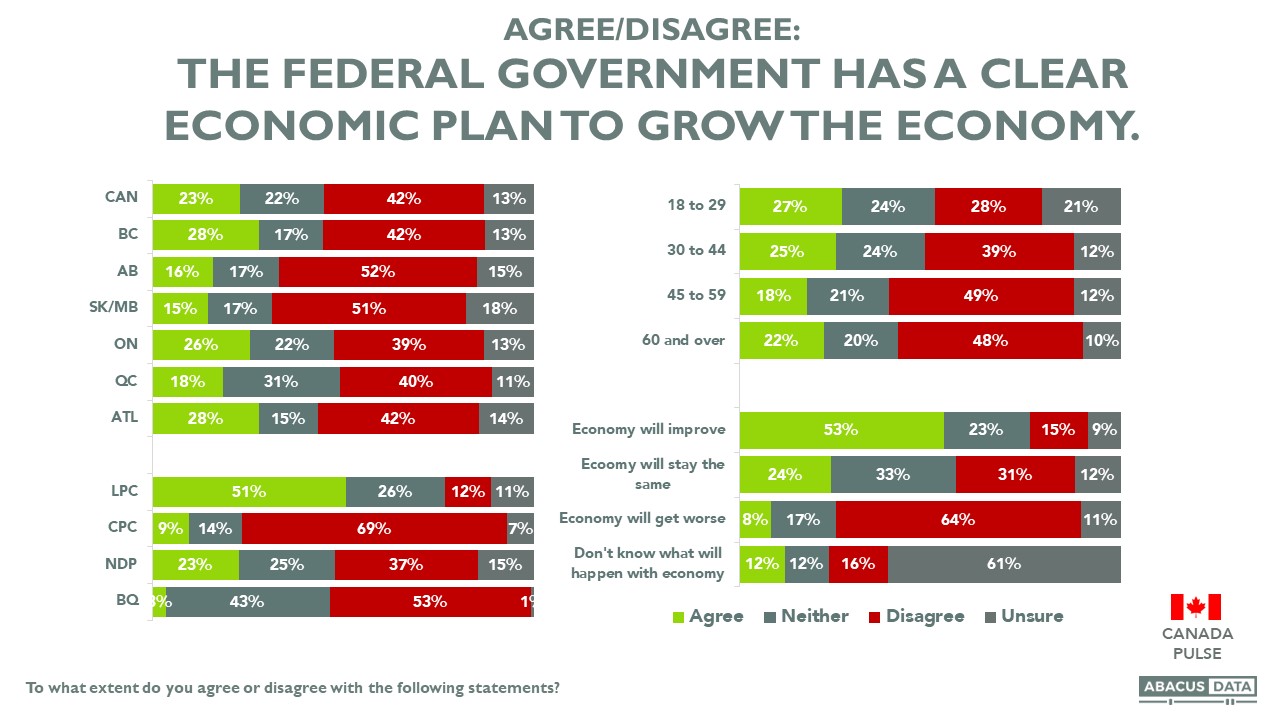Budget Politics: Why the federal budget matters so much to Liberal electorate fortunes.
March 27, 2023
On Tuesday, Finance Minister Chrystia Freeland will table the federal government’s budget, and the stakes could not be higher for the government.
Public assessments of the government’s performance and how they feel about the Prime Minister haven’t been much lower than they are today. Despite this, the Liberals and Conservatives are statistically tied in our latest measure of vote intention.
In our most recent national omnibus survey conducted from March 17 to 21, I asked 1,963 adults a few questions to gauge their economic outlook and how they feel about the government’s performance on a series of economic, fiscal, and pocketbook issues. The results suggest a very challenging opinion environment – one that I think the government and the Prime Minister desperately need to shift.
Here’s what I’m seeing:
The overall economic outlook isn’t that bad right now, but it’s not great either. When we ask Canadians to estimate whether the economy will improve, get worse, or stay about the same over the next 12 months, almost half think it is going to get worse but only 15% say it will get a lot worse. About 1 in 4 are optimistic things will improve over that time period.
Government Strengths and Weaknesses?
When we ask Canadians to evaluate the performance of the federal government and the Prime Minister in several areas, the government gets fairly good grades for its handling of Russia’s invasion of Ukraine, for representing the country internationally, and for working with the provinces. In each of those, half or more feel the government’s performance is at least acceptable.
It gets what I feel are middling grades for running an ethical government, managing the economy, and responding to the crisis in healthcare. On these, about 4 in 10 feel the government is doing at least an acceptable job.
But on two items in particular, the government is seen as severely underperforming – addressing the rising cost of living and making housing more affordable and accessible. On both, about 1 in 4 think the government is doing ok or better while two-thirds think it’s doing a poor or terrible job.
Even among 2021 Liberal voters, the cost of living and housing are challenging issues for the government. 4 in 10 past Liberal voters say the government isn’t doing even acceptably on those issues.
Part of the problem facing the government right now is its lack of narrative – especially an economic one. Case in point, when we ask Canadians whether they agree or disagree that “the federal government has a clear economic plan to grow the economy” only 23% agree, including 4% who strongly agree. In contrast, 42% disagree, 22% neither agree nor disagree and 13% are unsure.
I wish I had comparable data from previous years or previous governments, but these numbers feel low. If I was advising the Finance Minister, having only 1 in 4 people inclined to think you have a clear plan to grow the economy is a problem, and a serious liability, especially when people are feeling anxious and uncertain about the economy right now.
But the crosstabs provide even more concern. For example, those in vote-rich Ontario and Quebec are no more likely to think the government has a clear plan than those in other regions. And only 51% of Liberal supporters, those who say they would vote Liberal today, think the government has a clear economic plan.
But it gets worse for the Liberals…
When we ask all Canadians which party they feel will do best on several issues, the Liberals only have a slight advantage on one – dealing with climate change and the environment. Even when it comes to “making childcare affordable” – an issue that dominated the 2021 federal budget – the Liberals are basically tied with the NDP and only 7-points ahead of the Conservatives.
On EVERY economic and pocketbook issue, the Conservatives have a clear advantage over the Liberals. And a reminder, this is the same poll that found the Liberals only 2 points behind the Conservatives in voting intention.
The Conservatives are ahead of the Liberals by:
- 13 on managing the economy.
- 19 on keeping taxes low
- 15 on keeping interest rates as low as possible
- 11 on addressing the rising cost of living
- 7 on creating good-paying jobs
- 6 on protecting pensions and retirement security
The Upshot
These results underscore both the weakness of the Liberal government’s brand on economic issues and the opportunity it has in this budget to start to move these numbers.
One budget alone won’t fix the problem, but if the government uses it as an opportunity to start talking about pocketbook issues and the economy more, they may be able to reverse some of these numbers.
I think the problem is one of empathy and clarity. The federal government and its senior leaders aren’t connecting with people and empathizing with their day-to-day struggles. And there hasn’t been a clear economic narrative that people recall. With only 23% of Canadians believing the government has a clear economic plan, the budget presents an opportunity for the Liberal government to articulate its vision for economic growth and stability. Demonstrating a coherent strategy to address Canadians’ economic anxieties could help regain public trust.
Yes, the Conservatives have a natural advantage on economic issues. But it hasn’t always been that way. Tomorrow’s budget will either demonstrate a shift in strategy and approach, or it will reinforce what people already think.
METHODOLOGY
The survey was conducted with 1,963 Canadian adults from March 17 to 21, 2023. A random sample of panelists were invited to complete the survey from a set of partner panels based on the Lucid exchange platform. These partners are typically double opt-in survey panels, blended to manage out potential skews in the data from a single source.
The margin of error for a comparable probability-based random sample of the same size is +/- 2.3%, 19 times out of 20.
The data were weighted according to census data to ensure that the sample matched Canada’s population according to age, gender, educational attainment, and region. Totals may not add up to 100 due to rounding.
This survey was paid for by Abacus Data Inc.
Abacus Data follows the CRIC Public Opinion Research Standards and Disclosure Requirements that can be found here: https://canadianresearchinsightscouncil.ca/standards/
ABOUT ABACUS DATA
We are the only research and strategy firm that helps organizations respond to the disruptive risks and opportunities in a world where demographics and technology are changing more quickly than ever.
We are an innovative, fast-growing public opinion and marketing research consultancy. We use the latest technology, sound science, and deep experience to generate top-flight research-based advice to our clients. We offer global research capacity with a strong focus on customer service, attention to detail, and exceptional value.
We were one of the most accurate pollsters conducting research during the 2021 Canadian election following up on our outstanding record in 2019.
Contact us with any questions.
Find out more about how we can help your organization by downloading our corporate profile and service offering.









